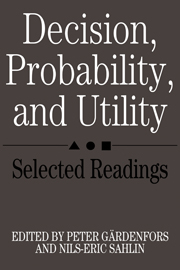Book contents
- Frontmatter
- Contents
- List of contributors
- Preface
- 1 Introduction: Bayesian decision theory – foundations and problems
- Part I Foundations of Bayesian decision theory
- Part II Conceptualization of probability and utility
- 6 Bets and beliefs
- 7 Slightly more realistic personal probability
- 8 Risk aversion as a problem of conjoint measurement
- Part III Questionable rules of rationality
- Part IV Unreliable probabilities
- Part V Causal decision theory
- References
- Name index
- Subject index
6 - Bets and beliefs
Published online by Cambridge University Press: 05 June 2012
- Frontmatter
- Contents
- List of contributors
- Preface
- 1 Introduction: Bayesian decision theory – foundations and problems
- Part I Foundations of Bayesian decision theory
- Part II Conceptualization of probability and utility
- 6 Bets and beliefs
- 7 Slightly more realistic personal probability
- 8 Risk aversion as a problem of conjoint measurement
- Part III Questionable rules of rationality
- Part IV Unreliable probabilities
- Part V Causal decision theory
- References
- Name index
- Subject index
Summary
The subjectivistic or personalistic interpretation of probability is playing a larger and larger role both in statistics and in philosophy these days. In statistics it is associated with the recent resurgence of Bayesian techniques which began with the work of Bruno de Finetti (1937/1964), and which has been enthusiastically championed in English-speaking statistical circles by L. J. Savage (1954). In philosophy the importance of this interpretation of probability has been felt in certain problems concerning induction, rationality, and decision-making, into which it has injected new spirit. It also has important connections with the (now) traditional logical approach of Carnap (1950) and his followers. Most of those who hold a logical view of probability – that is, those who think that there is at least one sense in which probability statements reflect logical relationships – now find in the personalistic arguments first stated by Ramsey (1931), and developed and refined by Savage, Lehman (1955), Kemeny (1955), and Shimony (1955) in recent years, a justification for the principles or axioms that any conventional logical probability theorist takes his logical probability relations to satisfy.
I think this subjectivistic interpretation of probability is mistaken, but I also think it is an important interpretation, and I think it is very important indeed to be very clear about why it is mistaken. A good part of this paper will be concerned therefore with a sympathetic presentation of the subjectivistic point of view, and a rebuttal of some common objections to it.
- Type
- Chapter
- Information
- Decision, Probability and UtilitySelected Readings, pp. 101 - 117Publisher: Cambridge University PressPrint publication year: 1988
- 3
- Cited by



